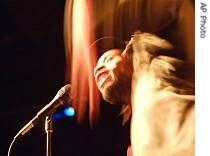2007年VOA标准英语-Spoken Word Poetry Promises a Better Future for
搜索关注在线英语听力室公众号:tingroom,领取免费英语资料大礼包。
(单词翻译)
By Rachel AbramsNew York
24 April 2007
Spoken word poetry - a mix of rap, storytelling and poetry - has captured the attention and talents of many New York City teenagers. In some instances, it has changed their lives completely. Correspondent Barbara Schoetzau has a report by intern1 Rachel Abrams on why this relatively2 new art form has a specific appeal to young people and what impact it may have on their future.
 |
| A competitive poetry slam at Nuyorican Poets Cafe in New York |
Tyrone Grizz, a 20-year-old poet who's been writing and performing in New York City since 2002. Grizz works with the local nonprofit organization Urban Word, which provides writing and performing workshops to area teens. Grizz's focus, however, is with spoken word poetry, a relatively new art form that has captured the attention of hundreds of young people in New York City. Poets often perform in "slams" - the common term for a competition in which each writer reads an original, three-minute piece to be judged by members of the audience.
Brian Henry is a teenage success story within this relatively small community. He helped lead the 2005 Urban Word slam Team to victory in the annual teen poetry slam, a national poetry competition. He has also been heard on Black Entertainment Television and Russel Simmons Presents: Def Poetry Jam.
"The only difference between rap music and spoken word is the beat," said Brian Henry. "If you take away a beat of a song and just have lyrics3, that's poetry. Poetry could be a journal entry, poetry could be an essay."
Observers say spoken word poetry has become an outlet4 for many young people to vent5 their frustrations6 in a safe, non-judgmental environment. Writers don't just tell their own stories but use the stage as a vehicle for social commentary.
Kesed Ragin is a 21-year-old poet who has had a lot of experience both performing for and working with other young writers. He's passionate7 not only about this art but also its impact on the performers.
"The youth, they all want to be a part of something, they all want to have a voice, they want to say something, they want to stand out," said Kesed Ragin. "It's hard growing up in America alone, just wanting to be noticed, and this is a medium for them to get up and say what they have to say. A lot of these youth come from underserved communities and their parents do not even notice them. This is a way for them to get noticed. You got the same youth who do it the other way. They get a spray can and go draw on the wall, whereas these youth, they take out a pen and a pad and they write out their frustrations."
For some, having a voice goes beyond just being a therapeutic8 form of expression. Kesed says many young people who have become involved have seen their lives and self-image drastically changed, especially those who may have grown up in underprivileged areas where they lacked educational resources.
"I've seen so many youth who did not even consider going to college and now they are about to graduate from universities," he said. "I've seen so many who were into drugs and gangs and so much negativity, but this showed them they have a voice and people care and that if you work hard enough you can get anything you please."
Kesed says the spoken word movement has been a way for youth to empower themselves. He believes more self-worth leads many to place more of a value on self-improvement.
Here's Carlos Gomez, a 25-year-old professional poet and activist9 who has taught poetry and creative writing to many young people like Brian and Kesed.
"I think the biggest change I've seen with young people that I've worked with is seeing them for the first time valuing reading and writing, some of them weren't strong English speakers, valuing themselves and their education," said Gomez. "Self-esteem is the most powerful thing. When someone finds something where they have ownership in it, where they are told that they not only can say anything they want but they have the power to be listened to and be respected and be taken seriously. That's the ultimate forum10 to develop a strong sense of self."
Carlos emphasizes that these changes extend beyond the paper and the stage, a sentiment Kesed and other young poets share.
"When the writing stops, their lives still continue," said Kesed. "We don't want to make it look like we only care about you in your writing and your performance and after that you leave this place, that's it, no. After you leave this place, it's a continuous battle and we try to be there with them for the whole thing. First you save yourself and then you save the world. I'm here for the long run. It's not a sprint11 it's a marathon."
Carlos and Kesed both say that these changes are not temporary. If you talk to these poets and mentors12, they will all tell you the same thing: That in the end, everyone hopes that these young people will have acquired the skills and values that will serve them later in life, not only to be successful artists but successful human beings.




